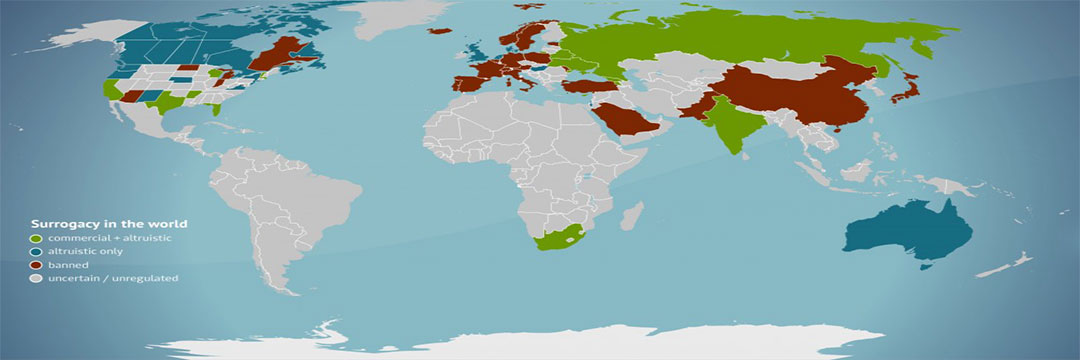Surrogacy Laws by Country

Surrogacy arrangement occurs when a woman undergoes in vitro fertilization to carry a child that has no genetic or biologic link to her. A surrogate mother relinquishes all parental rights as the gestational mother upon birth of the child. The fetus/child could be genetically linked to one; both or neither intended parents if donor DNA was used.
With regard to surrogacy and reproductive technology, legal considerations surround with surrogacy vary within countries and around the world. Some countries and states report favorable laws towards these reproductive technologies, others are restrictive and even unclear. The birth of a child through surrogacy brings great joy to couples who have not been able to conceive naturally yet there are complexities in some states where surrogacy is prohibited as per the law. Thus the legal aspects of surrogacy is quite complex in several states. Here is the brief description about the surrogacy laws in some states as:
North America
USA
In United States, surrogacy laws vary from state to state. It is legal to pay for a woman in 19 states for the surrogacy arrangements where commercial and altruistic contracts are allowed. However, it is restricted in almost 10 states. All children born via surrogacy in the US are eligible for a US passport, regardless of the citizenship of their parents. In some surrogacy friendly states only heterosexual couples can avail surrogacy arrangements.
Canada
The Assisted Human Reproduction Act (AHRC) allows only altruistic surrogacy: surrogate mothers may be reimbursed for approved expenses but payment of any other consideration or fee is illegal. The province of Quebec, however, prohibits all surrogacy.
South America
Brazil
In Brazil, there are no restrictions on surrogate motherhood according to law, but it cannot be used for commercial purposes, and, according to the court ruling.
Europe – UK
UK allows surrogacy arrangements under reasonable expenses. However, using a foreign surrogate has some constraints. A couple bringing a child born from a surrogate into the UK has to apply for a parental order to have parental rights.
UK law recognizes the surrogate mother as the child’s legal parents, even if the intended parents are named on the foreign birth certificate.
Surrogacy arrangements in some European countries including France, Germany, Italy, Spain, Portugal and Bulgaria that is either commercial or altruistic is illegal and is not authorized by the law.
Asia
India
Gestational, even commercial Surrogacy is legal in India since 2002. India is emerging as a leader and considered as Surrogacy capital of the world because of flexible laws and more cost effective than any other country. Every year foreign couples from western countries like UK, US and Australia come down to India to seek surrogacy services. The Indian Supreme Court decision to permit commercial surrogacy in the country has result a significant increase in international confidence in surrogacy in India.
Nepal
Nepal is considered as possibilities for surrogacy arrangements. There is currently no law or framework which recognizes surrogacy in Nepal. However, surrogacy arrangements have been allowed to take place in the countries in the recent years. Foreign gay couples also find this Himalayan country as the favorite destination for gestational surrogacy arrangements.
Russia
Surrogacy is allowed in Russia and is also one of the few providential countries which allow gestational and commercial surrogacy arrangements. The legal aspects of surrogacy are stipulated by the Family Code of the Russian Federation and the Russian Law on the Population Healthcare.
Australia
In Australia, commercial surrogacy is not permitted by law. However, altruistic surrogacy has been recently recognized legal in which financial expenses are not provided to the surrogate. In 2009, both Western Australia and South Australia passed a law that allows altruistic surrogacy legal only for heterosexual couples. In both these areas, surrogacy is restricted for single persons or gay or lesbian couples, under the Surrogacy Act 2008 and the Family Relationships Act 1975 respectively.
If you have any query related to this, Please let us know by submitting your queries in the section mentioned below or write us at mail@internationalfertilitycentre.com
